
ACTA CHROMATOGRAPHICA
Scope & Guideline
Innovative Insights in Chromatography and Beyond
Introduction
Aims and Scopes
- Pharmaceutical Analysis:
The journal frequently publishes studies involving the development of chromatographic methods for the quantification of pharmaceuticals, including drug formulation analysis and pharmacokinetic studies. - Environmental Monitoring:
Research on the detection and quantification of environmental pollutants and residues, particularly pesticides and organic compounds, is a prominent focus, highlighting the journal's commitment to environmental safety. - Method Development and Validation:
There is a consistent emphasis on the development and validation of new chromatographic techniques, including HPLC, UPLC, and LC-MS/MS, with a focus on improving sensitivity, efficiency, and eco-friendliness. - Biochemical and Clinical Applications:
The journal publishes works that explore the application of chromatographic techniques in biochemical assays and clinical settings, such as biomarker detection and analysis of biological fluids. - Quality Control and Standardization:
Research aimed at quality assessment and standardization of herbal and pharmaceutical products through chromatographic fingerprinting and chemometric analysis is a significant aspect of the journal's scope.
Trending and Emerging
- Green Analytical Chemistry:
There is a growing trend towards the development of eco-friendly chromatographic methods, highlighting sustainability in analytical chemistry, such as the use of green solvents and reduced waste. - Pharmacokinetics and Drug Interaction Studies:
Recent publications increasingly focus on pharmacokinetics and drug-drug interaction studies, showcasing the journal's alignment with contemporary pharmaceutical research and the need for comprehensive drug monitoring. - Multi-Component Analysis:
Emerging methodologies that enable the simultaneous analysis of multiple components in complex matrices are gaining traction, reflecting the need for efficiency in analytical procedures. - Application of Advanced Techniques:
The rise in studies utilizing advanced chromatographic techniques, such as ultra-high-performance liquid chromatography (UHPLC) and tandem mass spectrometry (MS/MS), demonstrates a trend towards sophisticated analytical capabilities. - Biomarker Discovery and Clinical Applications:
There is an increasing emphasis on using chromatographic techniques for biomarker discovery and clinical diagnostics, reflecting a broader trend in healthcare towards personalized medicine.
Declining or Waning
- Traditional Chromatography Techniques:
There is a noticeable reduction in the publication of studies solely focused on traditional chromatography methods, such as basic HPLC applications, as the field shifts towards more advanced techniques like UPLC and LC-MS/MS. - Non-Eco-Friendly Methods:
Research utilizing conventional, less environmentally friendly chromatographic processes is decreasing, with a clear trend towards greener methodologies being preferred in recent submissions. - General Method Comparisons:
The frequency of articles comparing multiple chromatographic methods without a specific application or advancement has diminished, suggesting a shift towards more targeted and innovative research.
Similar Journals
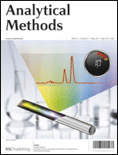
Analytical Methods
Elevating Standards in Analytical MethodologiesAnalytical Methods, published by the renowned Royal Society of Chemistry, is a distinguished journal that has been serving the scientific community since its inception in 2009. Specializing in the fields of Analytical Chemistry, Chemical Engineering, and General Engineering, this journal holds a reputable position with an impressive Q2 ranking in three relevant categories as of 2023. With its focus on innovative methodologies and advanced applications in analytical science, it aims to disseminate cutting-edge research and foster dialogue among researchers, professionals, and students. Although it is not an open access publication, it is accessible worldwide and provides critical insights into the latest developments in analytical techniques and their engineering applications. The journal also ranks highly in pertinent Scopus categories, such as being in the 77th percentile for General Engineering and 61st percentile for Analytical Chemistry, underlining its significance in advancing knowledge and practical applications in these fields. By participating in this journal, readers can expect to engage with high-quality research that influences the future of analytical practices and chemical engineering.
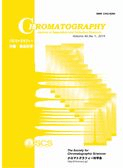
Chromatography
Pioneering techniques, bridging disciplines in chromatography.Chromatography is an esteemed journal published by the SOC CHROMATOGRAPHIC SCIENCES, dedicated to advancing the field of chromatographic techniques and their applications across various disciplines, including analytical chemistry, biochemistry, and environmental science. By facilitating the exchange of high-quality research, Chromatography plays a pivotal role in enhancing methodologies and technologies that drive innovation in sample analysis. While the journal is not currently open access, it maintains a rigorous peer-review process, ensuring the publication of valuable and impactful studies. Researchers, professionals, and students alike can benefit from its comprehensive coverage of chromatography-related advancements, making it a vital resource for anyone engaged in this dynamic area of study.

JPC-JOURNAL OF PLANAR CHROMATOGRAPHY-MODERN TLC
Innovating Analytical Chemistry, One Layer at a Time.JPC-JOURNAL OF PLANAR CHROMATOGRAPHY-MODERN TLC, published by Springer Heidelberg, is a pivotal resource in the fields of Analytical Chemistry, Biochemistry, and Clinical Biochemistry. With an ISSN of 0933-4173 and an E-ISSN of 1789-0993, this journal serves as an essential platform for the dissemination of innovative research on planar chromatography techniques, specifically modern thin-layer chromatography (TLC). With its upcoming coverage extending to 2024 and a third quartile ranking (Q3) across major scientific categories in 2023, it addresses the critical advancements and applications in analytical methods. Although it does not offer open access, the journal's rigorous peer-review process ensures high-quality findings that contribute to the progression of these vital scientific disciplines. The journal is located in Heidelberg, Germany, and continues to be a beacon for researchers, professionals, and students who seek to enhance their knowledge and practice in chromatographic techniques.
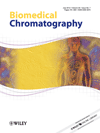
BIOMEDICAL CHROMATOGRAPHY
Innovating Analytical Techniques for Health SolutionsBiomedical Chromatography is a prestigious journal published by Wiley, focusing on the vital intersections of analytical chemistry, biochemistry, and clinical studies. With an ISSN of 0269-3879 and E-ISSN of 1099-0801, it has served the research community since its inception in 1986. The journal provides a platform for innovative research in areas such as drug discovery and pharmacology, achieving a commendable placement in Q3 across multiple categories in the 2023 metrics, including Analytical Chemistry and Biochemistry. Although it currently does not offer open access, it plays a crucial role in disseminating scientific developments and methodologies that contribute to advancements in health, safety, and pharmaceuticals. Researchers, professionals, and students can anticipate high-quality, peer-reviewed articles that drive forward the collective knowledge in biomedical applications. Located in the United Kingdom at 111 River St, Hoboken, NJ, the journal continues to attract contributions from global thought leaders in the field.
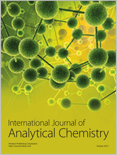
International Journal of Analytical Chemistry
Connecting Researchers to the Future of Analytical ChemistryInternational Journal of Analytical Chemistry, published by HINDAWI LTD, is a leading open access platform that has been advancing the field of analytical chemistry since its inception in 2009. With an ISSN of 1687-8760 and an E-ISSN of 1687-8779, this journal is headquartered in Egypt and serves a global audience, publishing high-quality research and reviews that explore innovative methodologies, techniques, and applications in analytical chemistry. Ranked in the Q3 quartile, the journal holds a notable position within its category, specifically at #90 out of 156 in the Scopus ranks for Analytical Chemistry, showcasing its impact within the scientific community. Researchers, professionals, and students can access a wealth of knowledge freely, as the journal promotes open access to facilitate the dissemination of critical research innovations. By bridging the gap between theoretical advancements and practical applications, the International Journal of Analytical Chemistry continues to play a pivotal role in shaping the future of analytical practices.
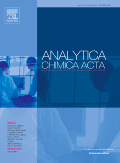
Analytica Chimica Acta
Elevating the discourse in spectroscopy and biochemistry.Analytica Chimica Acta is a prestigious peer-reviewed journal published by ELSEVIER, renowned for its significant contribution to the fields of analytical chemistry, biochemistry, environmental chemistry, and spectroscopy. Established in 1947, this journal has solidified its reputation, reflected in its impressive impact factors and Scopus rankings, including a Q1 classification in Analytical Chemistry and Spectroscopy, and a Q2 ranking in both Biochemistry and Environmental Chemistry. With its comprehensive scope, Analytica Chimica Acta aims to publish innovative research, critical reviews, and technical notes that advance the understanding and application of analytical methods. As an essential resource for researchers, professionals, and students alike, it encourages the dissemination of high-quality research that addresses contemporary challenges in chemical analysis and promotes interdisciplinary collaboration. While the journal operates primarily on a subscription basis, it also offers unique opportunities for authors to reach a broad audience and engage in the global scientific discourse.

RUSSIAN JOURNAL OF GENERAL CHEMISTRY
Advancing the Frontiers of General ChemistryThe Russian Journal of General Chemistry is a prominent scholarly publication dedicated to advancing the field of general chemistry. Published by MAIK NAUKA/INTERPERIODICA/SPRINGER, this journal contributes significantly to the global chemistry landscape, offering a platform for researchers and professionals to share their latest findings and methodologies. With an ISSN of 1070-3632 and an E-ISSN of 1608-3350, it has established itself as a resource for high-quality research articles since its inception in 1996. Though currently indexed in the Q4 category for chemistry (miscellaneous) and ranking #299 out of 408 in general chemistry according to Scopus, the journal remains an important venue for academic contributions that bridge gaps in traditional chemical disciplines. Desiring to cater to a diverse range of interests within chemistry, the journal actively encourages submissions that reflect significant scientific achievements, innovations, and collaborative studies. Although the journal does not currently offer open access, its role in disseminating crucial chemical research cannot be overstated. Researchers and students alike will find valuable insights and rigorous scientific discourse in its pages.

Separation Science Plus
Pioneering the future of analytical chemistry.Separation Science Plus is an emerging academic journal dedicated to advancing the field of analytical chemistry and separation science. Published by WILEY-VCH Verlag GmbH, this journal provides a platform for researchers to disseminate high-quality studies and reviews that address innovative techniques and breakthroughs in separation methodologies. With its ISSN 2573-1815, the journal has made significant inroads since its inception in 2018, encompassing a convergence period until 2024. Despite currently holding a Q3 ranking in Analytical Chemistry and a Q4 ranking in Filtration and Separation, its dedication to publishing impactful research makes it a vital resource for professionals and students alike. The journal operates under the robust scholarly reputation of WILEY, which is known for its commitment to excellence in scientific communication. Researchers interested in the latest advancements in separation techniques will find Separation Science Plus an essential read, fostering the exchange of knowledge and facilitating greater understanding within this specialized field.
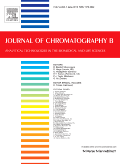
JOURNAL OF CHROMATOGRAPHY B-ANALYTICAL TECHNOLOGIES IN THE BIOMEDICAL AND LIFE SCIENCES
Advancing Analytical Excellence in Biomedical ResearchJOURNAL OF CHROMATOGRAPHY B-ANALYTICAL TECHNOLOGIES IN THE BIOMEDICAL AND LIFE SCIENCES, published by Elsevier, stands as a critical resource in the fields of analytical chemistry, biochemistry, and life sciences. With an impressive convergence of research spanning from 2002 to 2024, this journal delivers high-quality, peer-reviewed articles that advance the methodologies and practices related to chromatographic techniques and their applications in biomedical research. The journal enjoys a reputable standing in the academic community, reflected in its 2023 Scopus rankings—ranked in the 65th and 55th percentiles in Analytical Chemistry and Clinical Biochemistry, respectively. Although it does not offer open access, it provides a vital platform for exchanging innovative ideas and findings, guiding professionals and scholars in addressing the complexities of contemporary biomedical challenges. The journal’s focus on interdisciplinary research positions it as an essential tool for researchers, professionals, and students eager to enhance their knowledge and contribute to advancements in this dynamic field.

Separations
Innovating for a Cleaner, More Efficient WorldSeparations is a prestigious open-access journal published by MDPI, dedicated to advancing the fields of analytical chemistry and filtration and separation processes. Established in 2014, the journal has swiftly emerged as a significant platform for disseminating groundbreaking research and innovative methodologies in separation science, boasting an impressive E-ISSN of 2297-8739 and operating out of Basel, Switzerland. With its focus rotating from 2016 through 2024, Separations has been categorized in the Q3 quartile for both analytical chemistry and filtration and separation disciplines as of 2023, demonstrating its relevance in these scientific areas. The journal's rankings in Scopus, with 93rd out of 156 in analytical chemistry and 15th out of 19 in chemical engineering filtration and separation, reflect its commitment to high-quality research accessible to a global audience. Researchers, professionals, and students will find valuable insights and pioneering findings that foster collaboration and innovation within the vibrant community of separation science.